Last updated on September 6, 2024
Many of our customers from all over the world (actually) want to see Dublin as part of their tour of Ireland. And they always have lots of questions about it – do you…?
Page Contents (click line to jump the text)

Intro
If this is your first article on my blog, I need to explain briefly: We run a motorbike rental business in Ireland in the summer (https://www.easycruiser.tours), south of Dublin, and also offer guest rooms. We are originally from Germany, but have lived in Ireland for several years (second home).
Our motorbike guests and also our overnight guests are very international and often have lots of questions about Ireland, about Dublin, about practical travel topics and much more.
I have summarised and answered some typical questions about Dublin for you in this article.
I hope this is helpful for you – maybe some of your questions are included?
A little tip: You can select the questions that are of particular interest to you in the table of contents and then click on the line there to jump directly to the respective question in the text.
So let’s get started:
Is Dublin a beautiful city?
In other words, is Dublin worth visiting? Dublin has many beautiful corners and many beautiful views, but it doesn’t compare to some of those wonderful medieval city centres in Europe. There are beautiful sights and lots of life. You can do a lot here. I personally really like the waterfront location.
What is special about Dublin?
Dublin is a dynamic city with several universities and lots of young people. You’ll find history here, but also fun and nightlife and lots of activities. Dublin is also a UNESCO City of Literature and promotes all forms of art, from literature to painting, theatre and music.
What was Dublin called in the past – where does the name come from?
The old and current Gaelic-Irish name is “Baile Átha Cliath”, which roughly means “city of the hurdle ford”. A hurdle is a wickerwork of reeds used to secure a ford, i.e. a passage in the water.
When the Vikings built their harbour and a settlement at this location, they called the place “Duibhlinn”, which roughly means “deep or black pool or pond”. There are various interpretations of the name. From then on, they ruled over their kingdom of Duibhlinn for around 200 years.
However, both names show that there were early settlements on the water here, which were strategically important due to the sheltered bay and the location on the river. The English eventually turned “Duibhlinn” into Dublin.
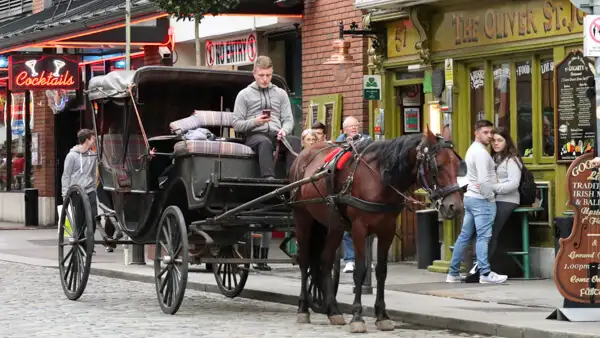
How old is Dublin?
The first records of the city by a traveller date back to 140 AD. It is not known when the first settlements were actually established here, as the Celts themselves left no writings.
Incidentally, the first Celts did not arrive in Ireland until around 600 BC. They were not the first inhabitants of the island, but little is known about the original inhabitants before the Celts. It is therefore quite possible that the first settlements here took place several thousand years ago.
What is historically interesting about Dublin?
Ireland has a strong Celtic identity and was ruled by Vikings, Anglo-Normans and finally the British before becoming an independent republic after several failed wars of liberation.
Much of today’s architecture dates from Victorian and Georgian times. I wrote an article about this topic, which you can find here: https://ireland-insider.com/dublin/the-cityscape-of-dublin-where-to-find-architectural-treasures/.
The harbour brought trade and contact with the world and contributed significantly to the city’s growing importance.
If you are interested in historical places and sights, then Dublin is an interesting city for you.
How many inhabitants does Dublin have?
County Dublin currently has a population of around 1.4 million, half of whom live in the city centre and half in the surrounding area.
However, many people from the neighbouring counties, i.e. from the surrounding area, also commute to Dublin more or less every day to work. If you add in the commuters, you can probably assume that around 2 million people live and/or work in Dublin.
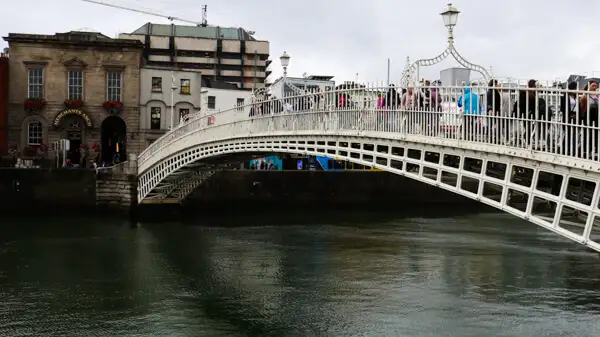
What languages are spoken in Dublin?
There are two official languages in Ireland, English and Gaelic, which the Irish call “Irish”. Both languages are taught at school and used as official languages. Irish is still used as an everyday language in some areas in the west of Ireland, the so-called “Gaeltacht”, but hardly at all in the east of the island and in Dublin.
In fact, many more languages are spoken in Dublin, as several universities attract students from all over the world. Many large American software companies, such as Google, Amazon and Microsoft, have major sites in Dublin and are therefore a magnet for the international labour market. And with millions of visitors from all over the world every year, you can actually hear many languages in Dublin.
Where is Dublin located? (continent, country, Europe…)
Dublin is located on the east coast of Ireland. Ireland is geographically part of the British Isles, which also include England. These are located in the Atlantic Ocean, off the coast of the European continent. France is the closest country to Ireland on the continent.
Is Dublin part of the EU?
Politically, the island of Ireland is divided into two parts. Most of the island belongs to the independent Republic of Ireland, which is a member of the EU. The north-east of the island belongs to the Republic of Northern Ireland, which is part of the United Kingdom (Great Britain) and left the EU with Brexit.
Is Ireland by the sea?
Yes, the island of Ireland is an island in the Atlantic Ocean and is completely surrounded by the sea. To the east of the island is Wales, to the north-east is Scotland, to the south is France and to the south-west is Spain. If you travel west from Ireland by boat, you will eventually reach North America.
What is the weather like in Dublin?
Dublin generally has a very mild climate. There is only about half as much rainfall on the east coast as on the west coast and it rains significantly more in the winter months than in the summer months.
The direct location by the sea means that there is always a fresh breeze to sweep away the clouds. Of course, there can always be a shower. The weather can therefore be changeable, but frost-free in winter and not too hot in summer. I personally find it very pleasant!
What is the best time to visit Dublin?
I think you can do a city trip to Dublin practically all year round. The temperatures are more pleasant in the summer months, but then it’s also crowded in the city, accommodation is booked up well in advance and everything is very expensive. It can also be very nice in spring or autumn, but the city is less crowded then.
Most people who combine a visit to Dublin with a tour of Ireland will probably do so between April-May and September-October, i.e. in the summer months.
Is Dublin an expensive city?
Dublin’s development has been booming for decades and there is no real end in sight. The housing market is becoming unaffordable and people are moving further and further out of the city to new development areas. Traffic is constantly increasing accordingly.
So yes, Dublin is quite an expensive city and quite comparable to other expensive cities like Hamburg or Munich for example.
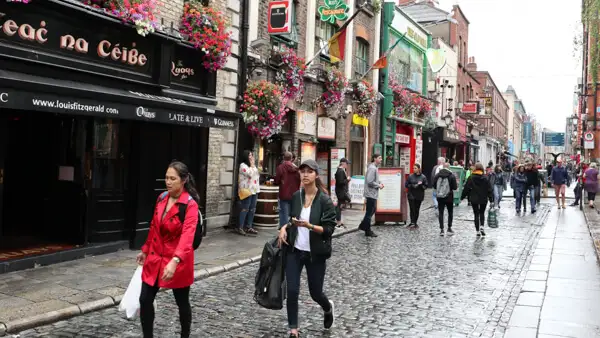
What currency is used in Dublin?
Ireland (the Republic of Ireland) is in the EU and uses the Euro as its currency. Dublin is the capital of the Republic of Ireland – so the euro (€) is used here.
Please note: Northern Ireland, with its capital Belfast, is part of Great Britain and uses the pound sterling as its currency.
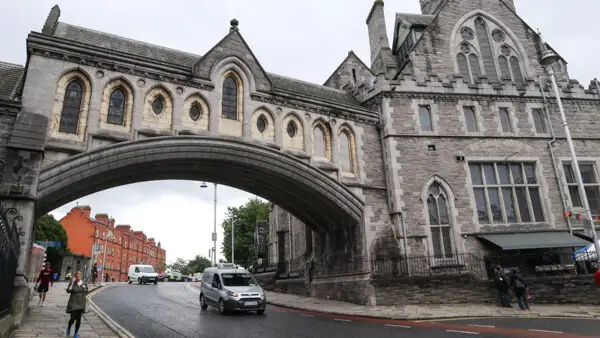
Is cash used in Dublin? Should you carry cash with you?
Yes, you should carry cash in Ireland. Although card payments are very common, occasionally this may not be the case.
Can I pay by card in Dublin?
In Dublin and Ireland, card payment is widespread and common debit cards and credit cards are usually accepted. However, bring several different cards with you and also carry cash, as it can happen that a card does not work.
My tip: Before travelling, make sure that your cards have been approved by your bank for the country you are travelling to!
Can you drink tap water in Dublin?
Tap water is normally safe to drink in Dublin and Ireland. The water quality of the sea and inland waters in Ireland is generally very good. This also applies to groundwater and public water networks. Personally, I practically always drink tap water in Ireland, no matter where I am.
What is the medical care like in Dublin?
There are several hospitals and clinics in Dublin, some of which are very good. Healthcare here is very good. It can be different in the countryside. Although there are GPs (general practitioners) in every small town, the nearest hospital can be a good hour’s drive away, or even further for specialised issues.
Important: If you are undergoing treatment, your health insurance card may not be accepted here. In this case, you pay for your treatment by credit card and receive a statement that you can submit to your health insurance company at home to get the money back later.
Is Dublin a safe city?
Ireland is generally one of the safest countries to travel to in Europe. Not even the police (Garda) are armed here, so how dangerous can it be? But seriously, neither we nor our motorbike tour customers have ever had a problem with theft or any other criminal issues.
Nevertheless, there is of course crime in Ireland and this is especially true in the capital city of Dublin, where most of the money is to be found!
Follow general travelling safety advice: Don’t wear unnecessary jewellery, don’t leave valuables on or in your vehicle and if a neighbourhood looks strange to you, don’t go there or move on.
Extra tip: In Northern Ireland in particular, there is a certain sensitivity about belonging to England or Ireland: avoid any political conversations there, especially in pubs.
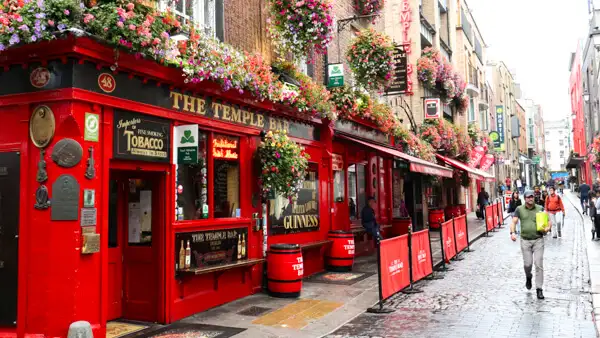
What is typical food in Dublin?
There are a lot of delicious traditional irish dishes available. I’ve already written an article about this, which I’ll link you to here. See: https://ireland-insider.com/dublin/great-food-in-dublin/.
What are typical drinks in Dublin?
The classics are Guinness and other local beers, as well as whiskeys and corresponding mixed drinks. I have also written an article about this, see: https://ireland-insider.com/dublin/dublins-liquid-gold-distillery-tours-and-brewery-experiences/.
What kind of power sockets are used in Dublin?
The three-pin UK plug with 230V is used on the Irish island. You should therefore bring appropriate travel adapters with you or buy them at the airport.
What do I need to enter Ireland and Dublin?
Even if you are coming from the EU, you should bring your valid passport with you, as you will need it in Northern Ireland at the latest.
If you are only planning a stay in Dublin, your identity card (ID) may also be sufficient. However, check this beforehand on the website of the Irish embassy in your country.
What typical souvenirs do you buy in Dublin?
Typical souvenirs from Ireland or Dublin are Irish handicrafts and jewellery with Celtic motifs, jumpers and other items of clothing made from Irish wool, T-shirts and hoodies with Celtic motifs, items related to the Guinness brand, Irish confectionery such as fudge or shortbread and Irish whiskey, as well as confectionery with whiskey.
What are the main sights in Dublin?
Oh, there are a lot. I’ve already written a nice article for you on this, see: https://ireland-insider.com/dublin/the-most-important-sights-in-the-city-of-dublin/.
You can find my other article on Dublin sightseeing tours here: https://ireland-insider.com/dublin/city-walks-and-city-tours-in-dublin-from-classic-to-special-formats/.
What is the centre of Dublin?
The centre of Dublin is located around the Temple Bar district. If you walk about 30 minutes in each direction from the Temple Bar pub of the same name, you will have seen most of the centre.
What is typical accommodation in Dublin?
While the traditional accommodation in the countryside is the small B&B, large hotels tend to dominate in Dublin. However, you will also find a good selection of cheaper hostels or homestays. I have an article on this, see: https://ireland-insider.com/dublin/where-to-stay-in-dublin-options-and-tips/.
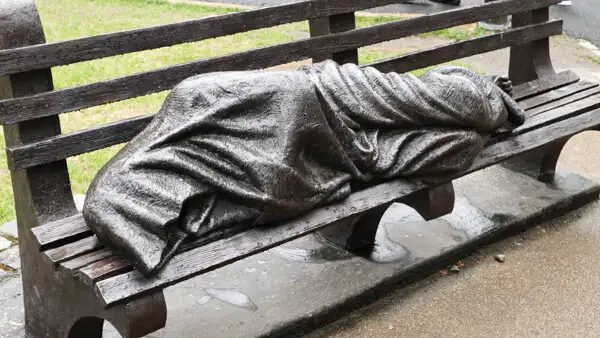
How do I get from the airport to the city centre?
Directly at the airport, in front of Terminal 1, you will find a large bus station. There are also regular and frequent buses to the city centre of Dublin. You will find an information desk on the ground floor of Terminal 1, but you can also buy a ticket from the driver.
Alternatively, you can also find taxis at the airport. The Uber service is also used by taxis in Dublin, so you can hop in a taxi straight away.
What is the best way to get around Dublin?
I can’t recommend hiring a car in Dublin, the traffic (left-hand traffic) is no fun. Buses and taxis are better because they use their own lanes. Even better: You can also explore the city centre on foot. See my article: https://ireland-insider.com/dublin/how-to-get-around-dublin-transport-and-practical-tips/.
Where can I find Irish live music in Dublin?
In many pubs in Dublin you will find live music several times a week, sometimes even daily. See my article with specific tips: https://ireland-insider.com/dublin/life-music-in-dublin-these-are-the-pubs-to-go/.
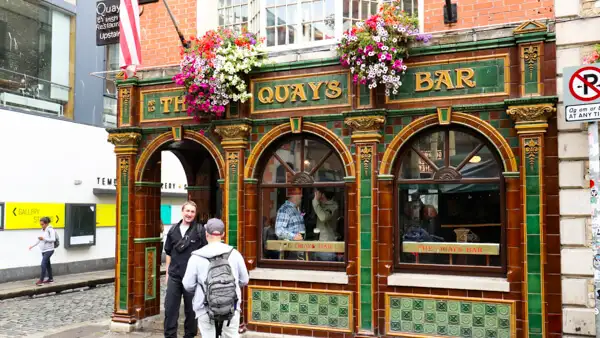
What religious sites can you visit in Dublin?
There are two very beautiful historic cathedrals in Ireland and lots of other churches, cemeteries and other religious sites. See also my articles on places of interest: https://ireland-insider.com/dublin/the-most-important-sights-in-the-city-of-dublin/.
Are the shops in Dublin open on Sundays?
In Ireland and Dublin you can always buy groceries on Sundays, so supermarkets are also open on Sundays. However, most other shops, such as those selling clothes, are closed on Sundays.
Are attractions in Dublin open on Sunday?
Most tourist attractions in Ireland and Dublin are also open on Sundays.
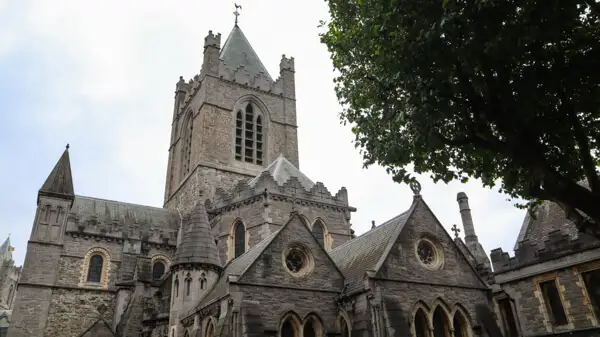
How does communication work in Dublin – SIM cards and WIFI hotspots?
Your European SIM card works fine in Ireland and roaming is free if your smartphone contract also covers other EU countries.
Our guests from the USA or other third countries often come with a dual-band smartphone and buy a prepaid SIM card in Dublin. This also works without any problems.
At the airport and in many other public places, as well as in hotels or restaurants, there is often free WLAN/Wifi. But in a small pub or small B&B in the countryside, there may not be.
Conclusion
I hope I was able to answer some of your questions?
In my blog you will find the menu item “Dublin”, where you will find even more interesting articles about the Irish capital. I’ve already linked some of them for you and I’ll link a few more below.
Have a great trip planning and a super interesting stay in Dublin!
More interesting articles for you
BEAUTIFUL DAY TRIPS FROM DUBLIN
THE MUSEUMS OF DUBLIN
POETS AND WRITERS IN DUBLIN – THE LITERARY HERITAGE OF IRELAND
DUBLIN FOR ART LOVERS
Picture credits cover picture: Promenade at River Liffey in Dublin, photo by Ulrich Knüppel-Gertberg (www.easycruiser.tours, www.irland-insider.de, www.ireland-insider.com)